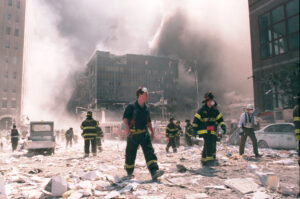The National Institute for Occupational Safety and Health (NIOSH) needs to closely monitor members’ timely access to health services under its World Trade Center Health Program, the Government Accountability Office (GAO) concluded in a new report (GAO-22-105303) released July 29.
Eligible responders and survivors of the September 11, 2001, terrorist attacks receive health services through the program at no cost, and NIOSH contracts with clinics in the New York City area and a Nationwide Provider Network (NPN) to provide health services.
Spending on health services under the program increased by about 85% from fiscal year (FY) 2016 through FY 2021. Clinics that serve responders in the New York City area accounted for most of the health services spending, the report found. Clinics that serve survivors in the New York City area and through the NPN accounted for a growing share of total spending over the period reviewed, according to the GAO, which recommended that NIOSH take three steps in monitoring program members’ access to health services:
- Add ensuring timely access to health services as a strategic program priority.
- Establish metrics for assessing the timeliness of access to health services through the NPN.
- Ensure that the Quality Assurance Committee reviews data metrics.
The Department of Health and Human Services (HHS) concurred with the GAO’s recommendations. NIOSH is one of the Centers for Disease Control and Prevention within HHS. However, HHS suggested that the program’s Quality Assurance Committee may not be the best forum for reviewing data on access to health services. HHS argued that underperforming contractors could be identified through documentation and data reviews, observation, and audits, and performance issues should be addressed by the program’s contracting officer and contracting officer’s representative.
The Quality Assurance Committee comprises senior program leadership, and it was established to develop quality assurance objectives, formulate plans for achieving those objectives, and monitor activities throughout the program. For example, the committee recommends the development of performance metrics for the program. NIOSH provides resources to the committee, including quality assurance staff, to support the committee’s priorities.
According to the GAO, the Quality Assurance Committee has not assessed the extent to which members have timely access to health services through the NPN because there are no quality assurance metrics for monitoring access. However, an NPN contractor previously collected information on timely access that was not provided to the committee. Data collected by the contractor indicated potential problems with the timeliness of members’ access to health services.
The GAO reviewed the World Trade Center Health Program as directed by a provision of the James Zadroga 9/11 Health and Compensation Reauthorization Act. The GAO’s mandate was to examine the extent to which program spending on health services increased, and NIOSH’s quality assurance efforts included assessing the timeliness of access to health services for members through the NPN.
In addition to researching workplace safety and health exposures and controls and developing recommendations for Occupational Safety and Health Administration (OSHA) standards, NIOSH also administers the World Trade Center Health Program and provides black lung screenings through the Coal Workers’ Health Surveillance Program (CWHSP).

